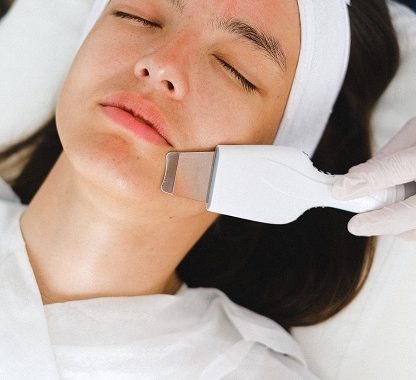
Acne can be a persistent challenge for many individuals, affecting not only physical appearance but also confidence levels. However, with the right skin care routine, one can effectively manage and mitigate acne-related issues.
In this article, we will explore a dermatologist-recommended skin care routine for acne-prone skin, addressing various concerns such as sensitivity, hormonal acne, and oiliness, while ensuring affordability and ease of implementation at home.
Dermatologist-Recommended Skin Care Routine for Acne-Prone Sensitive Skin:
For those with sensitive skin prone to acne, dermatologists advise a cautious yet impactful routine. Emphasizing gentleness, they recommend mild, fragrance-free products. Initiate the routine with a sulfate-free cleanser, ensuring a delicate cleanse without irritation.
Subsequently, incorporate a dermatologist-approved, alcohol-free toner to restore the skin’s pH balance. Opt for a non-comedogenic moisturizer enriched with calming ingredients like aloe vera or chamomile to provide essential hydration without exacerbating sensitivity.
This meticulous approach helps individuals manage acne effectively without compromising the delicate nature of sensitive skin.
Dermatologist-Recommended Skin Care Routine for Hormonal Acne:
Hormonal acne, characterized by cyclical breakouts linked to hormonal fluctuations, demands a specialized dermatologist-recommended routine. Incorporating products enriched with salicylic acid or benzoyl peroxide is crucial for addressing hormonal breakouts effectively.
Dermatologists often suggest starting with a mild cleanser to gently purify the skin, followed by targeted spot treatments to manage existing acne. The use of a non-comedogenic moisturizer ensures essential hydration without triggering further acne issues.
Regular exfoliation is also endorsed by dermatologists to prevent the build-up of dead skin cells, minimizing the risk of clogged pores. This holistic approach addresses the unique challenges posed by hormonal acne, promoting clearer and healthier skin over time.
Best acne scar removal products
Affordable Skin Care Routine for Acne-Prone Skin:
Achieving clear, acne-free skin doesn’t need to break the bank, as dermatologists advocate for affordable over-the-counter solutions that offer effective results. When formulating an economical skin care routine for acne-prone skin, prioritize cleansers containing salicylic acid or benzoyl peroxide.
These ingredients are renowned for their ability to target and eliminate acne-causing bacteria while promoting a clearer complexion. Opt for budget-friendly moisturizers enriched with hyaluronic acid or glycerin, as they provide essential hydration without aggravating acne concerns.
Sunscreen is a non-negotiable step in any skin care routine, even for those on a budget. Look for affordable options with at least SPF 30 to shield the skin from harmful UV rays, preventing further damage and supporting the healing process.
By incorporating these cost-effective yet dermatologist-approved elements into a daily routine, individuals can actively manage acne without compromising their financial well-being.
Best acne scar removal products
AM and PM Skincare Routine for Acne-Prone Skin:
Consistency is the linchpin in the battle against acne, underscoring the importance of a comprehensive morning (AM) and evening (PM) skincare routine.
Dermatologists stress the significance of initiating the day with a gentle cleanser, carefully chosen to remove impurities without causing irritation. This initial step is crucial as it prepares the canvas for subsequent products.
Following cleansing, the next imperative is to apply a lightweight moisturizer, providing essential hydration without overwhelming the skin.
Morning routines also demand the incorporation of a broad-spectrum sunscreen, a non-negotiable shield against harmful UV rays.
Sunscreen not only protects the skin from further damage but also safeguards the efficacy of other acne-fighting products. In the evening, meticulous cleansing assumes a heightened role, serving as a crucial reset button for the skin after a day of exposure to pollutants, makeup, and excess oil.
Dermatologists recommend thorough removal of makeup, followed by a cleanser suited to individual skin types.
Post-cleansing in the evening, the focus shifts to targeted acne treatments endorsed by dermatologists. These may include products containing salicylic acid, benzoyl peroxide, or prescription-based treatments for more severe cases.
Following the acne-specific regimen, a moisturizer tailored to the skin’s needs becomes paramount.
This dual-phase approach, diligently adhered to morning and night, is the cornerstone of a dermatologist-recommended skincare routine, offering a proactive defense against acne and promoting overall skin health.
Acne Skin Care Routine Products:
Selecting the right products is a pivotal step in establishing an efficient acne care routine that addresses specific skin concerns. Dermatologist-recommended cleansers play a central role, frequently formulated with potent ingredients like salicylic acid or benzoyl peroxide. These components work synergistically to combat acne-causing bacteria, unclog pores, and reduce inflammation, promoting a clearer complexion.
For targeted spot treatments, dermatologists often advocate for products containing sulfur or alpha hydroxy acids (AHAs). Sulfur is known for its antibacterial properties, making it effective in treating existing blemishes and preventing new ones. AHAs, on the other hand, gently exfoliate the skin’s surface, promoting cell turnover and preventing pore blockages.
The incorporation of a retinoid is another dermatologist-recommended strategy for acne management. Retinoids, derived from vitamin A, help regulate cell turnover, promote collagen production, and prevent the formation of comedones. This dual action aids in preventing acne and facilitating skin renewal, leading to a smoother and more even skin tone.
However, it is crucial to exercise caution when introducing new products to your routine. Consulting with a dermatologist is essential to ensure the compatibility of products with your skin type, minimizing the risk of adverse reactions. This personalized approach ensures that the chosen products effectively address acne concerns while prioritizing the overall health and balance of the skin.
Dermatologist Recommended Skin Care Routine for Oily Acne-Prone Skin:
People with oily skin face the challenge of excessive sebum production, which can lead to frequent acne breakouts. Dermatologists emphasize the importance of establishing a skincare routine that effectively manages oiliness without compromising the skin’s natural balance.
Initiate the routine with a gentle foaming cleanser designed to eliminate excess oil and impurities without causing irritation. Subsequently, include an alcohol-free toner in the regimen to control oil production and maintain a matte complexion.
Choosing oil-free, non-comedogenic moisturizers is crucial for individuals with oily skin. These products provide essential hydration without adding extra oil to the skin or clogging pores, promoting a healthy moisture balance.
Sunscreen is a non-negotiable step in the routine, offering protection against harmful UV rays that can exacerbate acne-related issues. Opt for a sunscreen with at least SPF 30 for comprehensive protection.
Dermatologists further recommend integrating clay masks or exfoliating treatments into the skincare routine to manage excess oil. Clay masks are effective in absorbing oil and impurities, promoting a smoother complexion.
Exfoliating treatments, containing ingredients like salicylic acid, help unclog pores and prevent future breakouts by removing dead skin cells.
In summary, a comprehensive skincare routine for oily, acne-prone skin involves gentle cleansing, oil control, appropriate moisturization, sun protection, and targeted treatments to manage excess oil and prevent acne breakouts.
Consulting with a dermatologist can provide personalized recommendations based on individual skin concerns and needs.
Best acne scar removal products
Conclusion:
Crafting an effective skin care routine for acne-prone skin involves understanding specific skin needs and addressing concerns such as sensitivity, hormonal imbalances, and oiliness.
By following a dermatologist-recommended regimen with affordable and readily available products, individuals can take control of their acne and achieve clearer, healthier skin.
Consistency and consultation with a dermatologist are key to developing a routine that best suits individual skin types and concerns.
Further Reading:
A Simple 3-Step Routine To Take Control of Acne
Acne-Prone Skin? Here’s How to Identify and Create the Right Routine
FAQs:
What should your skin care routine be for acne?
For an effective acne skincare routine, start with a gentle foaming cleanser to remove excess oil. Follow up with an alcohol-free toner to control oil production. Choose oil-free, non-comedogenic moisturizers and sunscreen for hydration without clogging pores. Integrate clay masks or exfoliating treatments recommended by dermatologists to manage excess oil. Use spot treatments with ingredients like salicylic acid or benzoyl peroxide. Maintain a consistent morning and evening routine, and consult with a dermatologist for personalized advice on products and frequency. Consistency is key in managing acne and promoting clearer, healthier skin.
�
What is the best skincare for acne?
The best skincare for acne typically involves a gentle yet effective routine. Start with a sulfate-free cleanser to unclog pores, followed by a dermatologist-recommended toner to balance pH. Incorporate products containing salicylic acid or benzoyl peroxide for targeted treatment. Choose a non-comedogenic moisturizer to maintain hydration without exacerbating acne. Sunscreen with at least SPF 30 is crucial for protection. Regular exfoliation and, if necessary, spot treatments are beneficial. Consult a dermatologist for personalized advice and product recommendations.
�
What is a good routine to get rid of pimples?
A good routine to get rid of pimples involves regular cleansing with a gentle, salicylic acid-based cleanser to unclog pores. Use a non-comedogenic moisturizer to maintain hydration without aggravating pimples. Apply benzoyl peroxide or salicylic acid spot treatment directly on pimples. Integrate a retinoid into your nighttime routine to promote skin renewal and prevent new breakouts. Avoid picking or squeezing pimples to prevent inflammation and scarring. Consistent use of sunscreen during the day helps protect the skin and prevent hyperpigmentation. Consult a dermatologist for personalized recommendations based on your skin type and specific concerns.
�
What are the 5 skin care routine?
- Cleansing: Begin with a gentle cleanser to remove impurities and prepare the skin.
- Toning: Apply an alcohol-free toner to balance the skin’s pH levels and control oil production.
- Moisturizing: Use a suitable, non-comedogenic moisturizer to keep the skin hydrated without clogging pores.
- Sunscreen: Apply sunscreen with at least SPF 30 in the morning to protect the skin from harmful UV rays.
- Targeted Treatments: Incorporate specific treatments recommended by dermatologists, such as acne-fighting products or anti-aging serums, based on individual needs.
�



